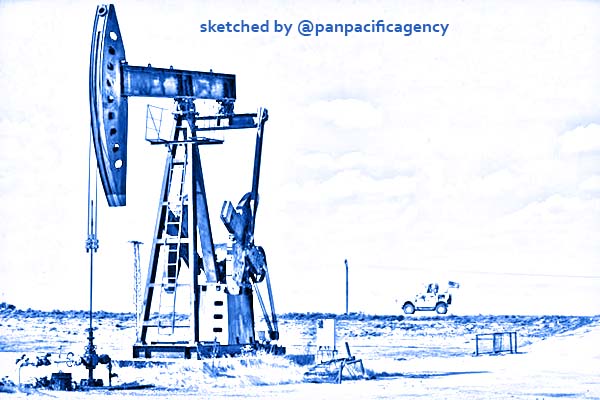Oil, gold and stocks whipsawed as Iran strikes spark Mideast war fears

US oil futures were up 3.9 per cent at US$65.13 a barrel at 8.13am in Singapore. PHOTO: AFP. Sketched by the Pan Pacific Agency.
SHANGHAI, Jan 8, 2020, Reuters. Asian shares tumbled on Wednesday (Jan 8), while oil and safe-haven gold shot higher after Iran fired rockets at US-led forces in Iraq, stoking fears of a wider conflict in the Middle East, The Straits Times reported.
Early reports of the attacks sparked risk aversion and a flight to safety on worries over how the United States would respond.
But oil prices later shed some of its big gains and Asian stocks trimmed losses as investors paused for breath after US President Donald Trump said in a tweet that “All is well!”, and “So far, so good!”.
Oil prices steadied 1 per cent higher on Wednesday, well below peaks hit in frenzied trading earlier in the day after a rocket attack by Iran on American forces in Iraq raised the spectre of a spiraling Mideast conflict and disruption to crude flows.
Prices gave up most of their early gains as analysts said market tension could ease as long as oil production facilities remain unaffected by attacks. Tweets by US President Donald Trump and Iran’s foreign minister also appeared to signal a period of calm – for now.
Brent crude futures were up 73 cents, or 1.1 per cent, to US$69 by around 0742 GMT, after earlier rising over 4 per cent to as high as US$71.75, the most since mid-September 2019.
West Texas Intermediate crude futures gained 53 cents, or 0.9 per cent, to US$63.23 a barrel. It earlier hit US$65.85, the highest since late April last year.
Iran’s missile attacks on the Ain Al-Asad air base and another in Erbil, Iraq, early in the day came hours after the funeral of an Iran’s top military commander whose killing in a US drone strike has intensified tensions in the region.
“We are getting exaggerated moves but that’s of course volatility playing. Markets simply hate uncertainty. It’s an old adage but it definitely holds true in the current situation – markets can price risks but they can’t price uncertainty,” said James McGlew, executive director of corporate stockbroking at Argonaut in Perth.
In his tweet late Tuesday, Trump said that an assessment of casualties and damage from the strikes was under way and that he would make a statement on Wednesday morning. A US official said the United States was not aware of any casualties from the strikes.
European equity markets were expected to open lower, with pan-region Euro Stoxx 50 futures down 0.77 per cent, German DAX futures off 0.91 per cent and FTSE futures 0.45 per cent lower.
In Asia, MSCI’s broadest index of Asia-Pacific shares outside Japan was down 0.72 per cent, having dropped more than 1 per cent earlier in the day. China’s blue-chip CSI300 index was 1.18 per cent lower.
Japan’s Nikkei dipped 1.57 per cent, paring earlier losses of more than 2 per cent, while Australian shares clawed back from a more-than-1 per cent drop to shed 0.13 per cent. US S&P 500 stock futures, which had earlier tumbled nearly 1.7 per cent, were down 0.38 per cent.
Singapore stocks also sank after trading began on Wednesday. The Straits Times Index plunged 1.4 per cent to 3,208.04 at 9.51am before recouping most of its losses to trade down 0.3 per cent at 3,239.02 at 4:26pm.
Shares of Singapore Airlines, which said on Wednesday morning it was diverting all flight routes from Iranian airspace, trimmed its losses to four cents or 0.4 per cent to $8.97 as of 4:42pm local time after earlier sinking 1.67 per cent.
Gold also fell below a key psychological level as initial fears eased. The precious metal was 1.30 per cent higher on the spot market at US$1,594.33 per ounce, having earlier blasted through US$1,600.
Rob Carnell, Asia-Pacific chief economist at ING in Singapore, said possible further escalation of tensions between Iran and the United States could still provoke a prolonged negative market reaction.
“If you see US treasuries rallying a bit this morning, expect them to rally quite a bit further should there be a forceful response from the United States, which I’d imagine there would be… from a market perspective I think this one could run and run,” he said.
The yield on benchmark 10-year US Treasury notes last stood at 1.7742 per cent, down from a US close of 1.825 per cent on Tuesday, but up from session lows. US 10-year Treasury futures had earlier peaked at their highest level since November, and were last up 0.29 per cent.
The two-year yield fell to 1.5061 per cent compared with a US close of 1.546 per cent.
The yen, which had hit its strongest point against the greenback since October in morning trade, gave up most of its gains later in the day. The US currency was last down 0.11 per cent against the yen at 108.30.
The euro was 0.03 per cent weaker, buying US$1.1147 and the dollar index, which measures the greenback against six major peers, was 0.06 per cent lower at 96.949.
Analysts say the escalating Middle East tensions are likely to keep markets on edge.
“If it does look like we’ve got US casualties, then I don’t think Trump is going to just stand back and take that,” said Matt Simpson, a senior market analyst at Gain Capital in Singapore.
“World War III has been thrown around. I don’t think we’re there yet. But it does look like Iraq II.”